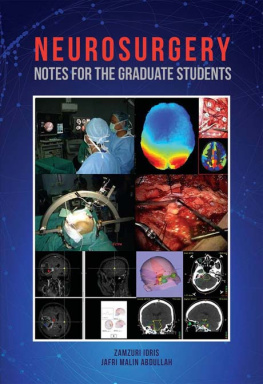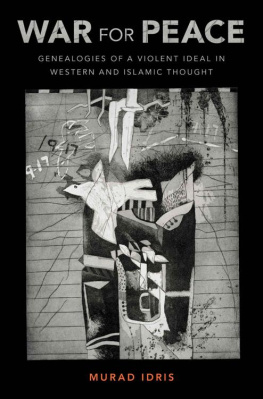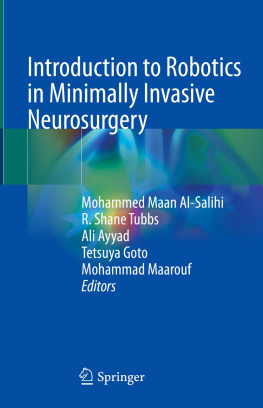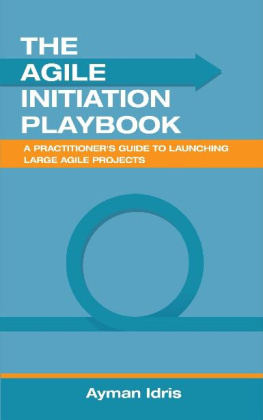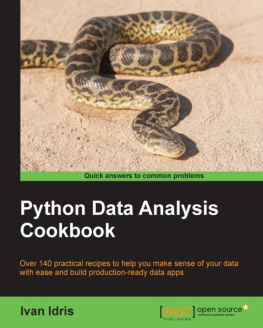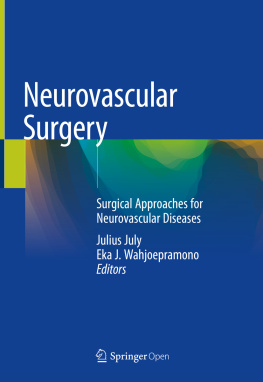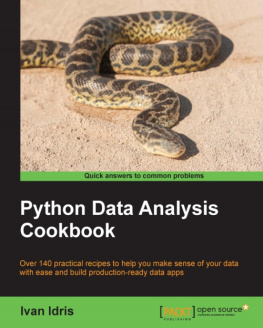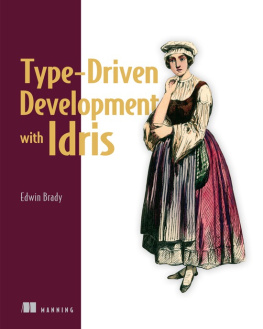Zamzuri Idris - Neurosurgery Notes For The Graduates Students
Here you can read online Zamzuri Idris - Neurosurgery Notes For The Graduates Students full text of the book (entire story) in english for free. Download pdf and epub, get meaning, cover and reviews about this ebook. publisher: Penerbit USM, genre: Home and family. Description of the work, (preface) as well as reviews are available. Best literature library LitArk.com created for fans of good reading and offers a wide selection of genres:
Romance novel
Science fiction
Adventure
Detective
Science
History
Home and family
Prose
Art
Politics
Computer
Non-fiction
Religion
Business
Children
Humor
Choose a favorite category and find really read worthwhile books. Enjoy immersion in the world of imagination, feel the emotions of the characters or learn something new for yourself, make an fascinating discovery.
- Book:Neurosurgery Notes For The Graduates Students
- Author:
- Publisher:Penerbit USM
- Genre:
- Rating:5 / 5
- Favourites:Add to favourites
- Your mark:
- 100
- 1
- 2
- 3
- 4
- 5
Neurosurgery Notes For The Graduates Students: summary, description and annotation
We offer to read an annotation, description, summary or preface (depends on what the author of the book "Neurosurgery Notes For The Graduates Students" wrote himself). If you haven't found the necessary information about the book — write in the comments, we will try to find it.
Neurosurgery Notes For The Graduates Students — read online for free the complete book (whole text) full work
Below is the text of the book, divided by pages. System saving the place of the last page read, allows you to conveniently read the book "Neurosurgery Notes For The Graduates Students" online for free, without having to search again every time where you left off. Put a bookmark, and you can go to the page where you finished reading at any time.
Font size:
Interval:
Bookmark:
NEUROSURGERY
NEUROSURGERY
Notes for the Graduate Students
ZAMZURI IDRIS
JAFRI MALIN ABDULLAH

PENERBIT UNIVERSITI SAINS MALAYSIA
PULAU PINANG
Penerbit Universiti Sains Malaysia, 2017
EPUB, 2017
Perpustakaan Negara MalaysiaCataloguing-in-Publication Data
Neurosurgery : notes for the graduate students / Zamzuri Idris,
Jafri Malin Abdullah.
e-ISBN 978-967-461-118-7
Copy Editor: Noriyanti Jahaya
Cover Designer: Intan Suhaila Kassim
Proofreader: Aida Izana Yaakub
Typesetter: Rosni Habib
Published by Penerbit Universiti Sains Malaysia, 11800 USM Pulau Pinang, Malaysia.
A member of the Malaysian Scholarly Publishing Council (MAPIM).
This e-book is best viewed with iBooks. Penerbit USM shall not be liable for any loss or damage caused by any changes due to usage of any application.
I dedicate this Neurosurgery: Notes for the Graduate Students to all the residents and young neurosurgeons (especially ones in Malaysia). Some did read the books but could not grasp the important concepts or points. I have designed this book in notes format to provide a comprehensive, yet easy-to-read, summary of the essential topics in neurosurgery.
The authors want to make this book as an additional knowledge which can be added to what have been known by the readers. Its purpose is to highlight the important points in certain topics of neurosurgery.
In neurosurgery, the real truth is not clear in some concepts. Therefore, it is only a guide in notes-format to make readers quickly grasp the important points. Some facts are arguable and may change over time. The contents were largely gained from my personal experience, notes taken during my training, notes taken during conferences, personal discussion with the seniors in neurosurgery all over the world and from current journals in neurosurgery.
It is only a book with some important knowledge that the authors have and would like to emphasise or share with students. It is not to replace other excellent referral neurosurgical text-books. Therefore, students should read this book as only an additional knowledge which could be subjected to further discussion.
Thanks to my teachers: Professor Dato Dr Jafri Malin Abdullah, who co-authored this book, Professor Dr Zurin Adnan, Professor Dr Luc Calliauw, Associate Professor Dr John Thanakan, Associate Professor Dr Hillol Kanti Pal, Dr J George, Dr Safari Haspani, Dr Johari Siregar, Dato Dr Fadzli Cheah Abdullah, Professor J Caemaert, Professor Dirk Van Roost and many more. They had taught me Neurosurgery. Credit to them and may god bless them all.
Finally, many thanks to Mr Mohd Mustakim Ibrahim for helping me with the figures. Associate Professor Dr Abdul Kareem from our radiology department for providing the temporal bone fracture features on CT scans.
Good luck and have knowledge from my innovation.
1.Saint Augustine (354430): The World is a book, and those who do not travel, only read a page
2.Professor Dr M Gazi Yasargil (father of modern neurosurgery):
(a)The more you know, the more you see and
(b)The brain actually is not like a single organ. Its like a country, there are many organs; and each one a city, like St. Louis: Theres a vascular organ, an endocrine organ, an immunological organ. All in the brain.
3.Z Idris 2014: You need fitness in all: brain, mind, spirit and body to explore optimally the beauty of the brain and nervous system.
Zamzuri Idris
June 2016
History of presenting complaint shoud cover the following:
1.Nature of complaint
2.The onset: how did it begin, sudden or gradual in onset
3.The duration: acute, subacute and chronic
4.The time course: stepwise fashion, progressed then stabilized
5.Other positive neurological symptoms
6.Precipitating and relieving factors
7.Extent of any deficit such as inability to put the slippers on, unable to walk, cook, comb hairs
8.Affects on function or daily activities
9.Previous treatment and investigations
Direct questioning (part of history presenting complaint) should cover the following:
1.Other negative neurological symptoms: headache, numbness, seizures, vision and others (to show that you did ask the relevant issues here!)
2.Bowel and bladder status
3.Risk factors
4.Neuroendocrine questions
5.Developmental history if you think the case has strong developmental aetiology
All relevants issues noted in Past Medical History, Social History, Developmental history (etc.) should be mentioned at history of presenting complaint, so that all relevant things have been gathered and delivered to the examiners sooner rather than mentioned those relevant things separately in different subheadings (the examiner can get bored!). This pattern (separately in different subheadings) is more for undergraduate!
Full neurological examination consists of six components:
1.Level of consciousness/mental status
2.Cranial nerve examination
3.Motor examination
4.Sensory examination
5.Reflexes
6.Coordination and gait
Focused neurological examination is a problem-based examination (based on the chief complaint and manifested symptoms) which should be conducted in an efficient time frame with purpose of localizing the lesion.
1.Higher mental functions
a.Conscious level
- Normal/alert
- Drowsy
- Stuporous
- Comatose
- According to GCS for trauma patient: Note that purposeful movement towards changing painful stimuli (patients hand crosses the midline with deep sternal rub or gets above the clavicle with supraorbital ridge pressure) means localizing to pain (a score of 5 for motor response). Flexion at the arms and elbows, hyperextension of the legs (decorticate) means decorticate posturing or abnormal flexion with score of 3. Decerebrate posturing (score of 2) when both upper and lower limbs are hyperextended. Pulling part of the body away when pinched, exhibiting normal flexion indicating score of 4 or withdrawal to pain or normal flexion to pain.
b.Speech
i. Handedness
ii.Language aphasia and dysphasia (); spoken and written language
Table 1 The classical perisylvian aphasias
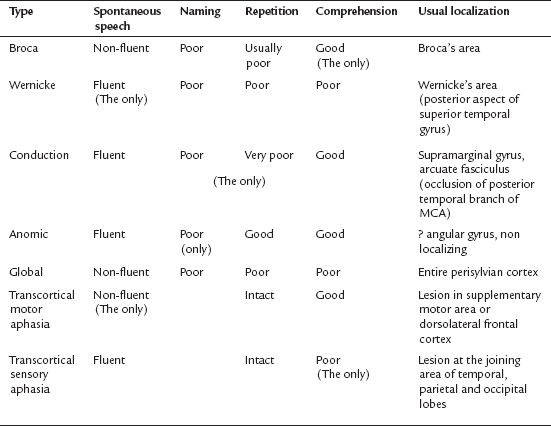
iii.Spontaneous speech word output, melody (an affective component of speech = non-dominant hemisphere), grammar, neologism, paraphasia
iv.Repetition [Bank Bumiputra Malaysia Bhd (1 score)]
v.Comprehension auditory and visual
vi.Reading (abnormality = alexia/dyslexia)
vii.Writing sentences (1 score) (abnormality = agraphia) Perception of written language is located in angular gyrus. But if both affected, alexia and agraphia = lesion is in inferior parietal lobule. The alexia without agraphia (able to write but inability to read aloud, name colours or understand written script) occurs in lesion affecting the left geniculocalcarine tract. They may also have right homonymous hemianopia.
viii.Naming (2 score for naming 2 objects correctly)
ix.Echolalia repeat words or phrases that he/she heard
x.Neologisms made-up words
c.Mini-mental state
- Not all patients were asked in detail, depends on presenting complaints and clinical suspicion.
- Orientation person, time, place, date, day (5 score).
- Attention span (count days backwards) (5 days = 5 score).
- Memory immediate (repeat three things: 3 score), recent (what did you have for your breakfast/lunch today? or repeat the task on immediate memory testing after 5 minutes: 3 score) and remote.
Font size:
Interval:
Bookmark:
Similar books «Neurosurgery Notes For The Graduates Students»
Look at similar books to Neurosurgery Notes For The Graduates Students. We have selected literature similar in name and meaning in the hope of providing readers with more options to find new, interesting, not yet read works.
Discussion, reviews of the book Neurosurgery Notes For The Graduates Students and just readers' own opinions. Leave your comments, write what you think about the work, its meaning or the main characters. Specify what exactly you liked and what you didn't like, and why you think so.

